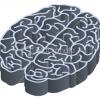This is an interesting topic that brings back vivid memories. I would like to add my own experience. I have done many drugs, but I think the repercussions from MDMA were the worst of all of them, although at the height of the high it seemed to be the most blissful of the many natural or synthetic substances I have ever ingested. If I had taken pure MDMA in a supervised condition in the most favorable circumstances, certainly that would have been better than getting whatever I could get. Even so, when you artificially lift yourself up to such an incredible high, you must come down. The extreme drop is quite harsh.
Without getting in too deep, you not only deal with physical consequences, you can also open yourself up to psychic influences because you may have created tears or holes in your aura, your electromagnetic, energetic protective web or field. This is your filter that protects you from negative external influences. People think they are only dealing with the effects of physical chemicals here, but you cannot separate the physical from the metaphysical. There are physical toxic effects, as well as psychic toxic effects. These things happen folks. I will not vouch for everyone’s experience, since some people can be much more resilient than others, but this is a powerful drug we are dealing with, and this is more likely to happen than not.
I compare the artificial high from MDMA with reaching higher states of consciousness, naturally, such as in a kundalini awakening. The whole awakening cycle can lead to a burnout, where the body’s resources have been used up to climb the heights of the awakening peak. What goes up must come down. Of course, it doesn’t have to be a terrible experience, but what is called the “Dark Night of the Soul” is usually experienced. I liken it to the darkest hour before the dawn of a beautiful new day. This is a natural cycle, and for many, very appropriate because it can provide a profound and valuable growth experience.
I experienced this Dark Night of the Soul at the tail end of my MDMA addiction. I think this was the lowest point of my entire life, and there were many, many low points before and after that event, so the experience had a lot of competition for that slot! I experienced years of depression before that, but the MDMA pushed me to my rock bottom point. Of course, I don’t regret that because I figured out how to put the pieces of myself back together and to rebuild something new. It did take years, though.
Under perfect controlled circumstances, perhaps MDMA could be helpful to achieve a specific purpose, with the support of others, with all the right nutrients and a healthy physical foundation, but I think there are few who are fortunate enough to have all of these elements in place. But, I do understand that some people are in serious need of drastic measures when nothing else has worked to resolve intolerable suffering. Some people may need crazy things to happen to wake them up or heal them. To that, I leave you with the words of a master:
“Use only that which works, and take it from any place you can find it.”
-Bruce Lee, Tao of Jeet Kune Do
Edited by Polaris, 18 October 2012 - 12:58 AM.


















































